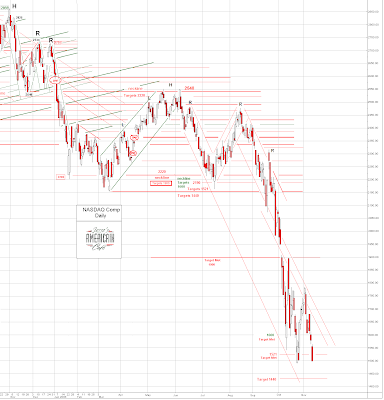"Indirect bidders, a class of investors that includes foreign central banks, bought 18 percent of the securities offered, down from 43 percent at the last sale"
U.S. Treasuries Fall After Investors Shun 30-Year Bond Auction
By Cordell Eddings and Sandra Hernandez
Nov. 13 (Bloomberg) -- Treasuries fell, led by 30-year bonds, after investors shunned the government's $10 billion sale of the securities amid concern that U.S. debt sales will grow...
``The 30-year is not a central bank product, and there's no real interest from pension funds'' at a yield below 4.5 percent, said Andrew Brenner, co-head of structured products in New York at MF Global Ltd., the world's largest broker of exchange-traded futures and options contracts. ``There's just no interest in it...''
``In the current market environment there are still too many unknowns,'' said William Larkin, a portfolio manager at Cabot Money Management in Salem, Massachusetts, which manages about $500 million in assets. ``People are looking for the safety of the shorter-term securities....''
Indirect bidders, a class of investors that includes foreign central banks, bought 18 percent of the securities offered, down from 43 percent at the last sale....
Futures on the Chicago Board of Trade show an 80 percent chance the Fed will lower its 1 percent target rate for overnight bank lending by a half-percentage point at its Dec. 16 meeting. The odds were 58 percent a week ago.
The difference between what banks and the Treasury pay to borrow money for three months, the so-called TED spread, was 1.96 percentage points, compared with 4.57 percentage points a month ago.
The federal budget deficit in October, the first month of fiscal 2009, climbed to a record $237.2 billion, spurred by U.S. purchases of stakes in some of the country's largest banks. It exceeded the budget shortfall for President George W. Bush's first full year in office...
13 November 2008
Central Banks Shun the US Long Bond Auction - "Too Many Unknowns"
12 November 2008
Congressman Asks Fed to Stop Ignoring Requests for Transparency

Boehner Demands Fed Identify Recipients of Loans
By Laura Litvan
Nov. 12 - House Republican leader John Boehner called for the Federal Reserve to disclose the recipients of almost $2 trillion of emergency loans from American taxpayers and the troubled assets the central bank is accepting as collateral.
Boehner, in a prepared statement, also asked the Federal Reserve to comply with a Freedom of Information Act request seeking details about the loans.
The Fed ``should comply with this Freedom of Information Act request, and in the interest of full and fair disclosure, they must begin providing lawmakers and taxpayers all information about how they are using federal tax dollars,'' Boehner said.
Fed Chairman Ben S. Bernanke and Treasury Secretary Henry Paulson said in September they would comply with congressional demands for transparency in a $700 billion bailout of the banking system. Two months later, as the Fed lends far more than that in separate rescue programs that didn't require approval by Congress, there is little disclosure about how the programs are being implemented.
Bloomberg News requested details of the Fed lending under the U.S. Freedom of Information Act and filed a federal lawsuit Nov. 7 seeking to force disclosure.
A spokesman for the Federal Reserve didn't immediately respond to requests for comment.
`Oversight, Transparency'
Boehner said he is increasingly concerned that the government's actions to add stability to financial markets is moving into areas that were not the stated intention when Congress approved $700 billion for a Treasury-administered program to bail out the financial sector that is being weighed down by the housing crisis.
``During the bipartisan negotiations between Congress and the administration, members of both parties made clear that Congress must have meaningful oversight over the use of taxpayer dollars,'' Boehner said. ``Transparency is even more important now, given that the program appears to have been implemented in some ways that were given little to no discussion as Congress was being urged to pass the rescue plan.''
Senator John Cornyn of Texas, a member of the Republican leadership, said the lack of disclosure ``should trouble taxpayers and policymakers alike.''
``There cannot be accountability in government and in our financial institutions without transparency,'' he said. ``Many of the financial problems we are facing today are the direct result of too much secrecy and too little accountability.''
Representative Scott Garrett, a New Jersey Republican who serves on both the Financial Services and Banking committees, said ``it's impossible to get to the bottom of where we are because we don't have transparency.''
GE Receives FDIC Backing for its Debt

Do you get the feeling that the financial sector is in a hostile takeover of the country?
AP
FDIC to back GE Capital debt
November 12, 3:45 pm ET
FDIC to guarantee up to $139 billion of debt issued by GE's financing arm
HARTFORD, Conn. (AP) -- General Electric Co. says its massive finance business, hard hit by turmoil in the credit markets, is now eligible for federal backing of up to $139 billion of its debt.
GE says the Federal Deposit Insurance Corp. approved GE Capital Corp. to participate in the Temporary Liquidity Guarantee Program.
Russell Wilkerson, a spokesman for Fairfield, Conn.-based GE, says up to $139 billion in short- and long-term debt is guaranteed. He says GE will now be on the same footing as competitors who also have federal backing.
Nearly half of GE's earnings are from its finance business, with the remainder from its industrial business that makes everything from locomotives to water treatment plants, and from NBC-Universal.


































